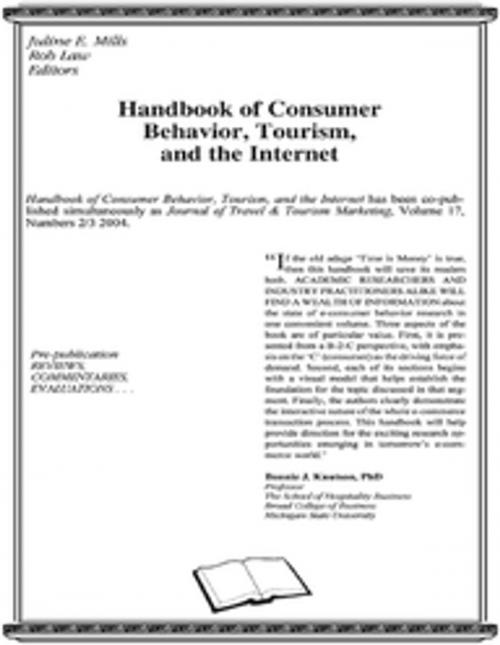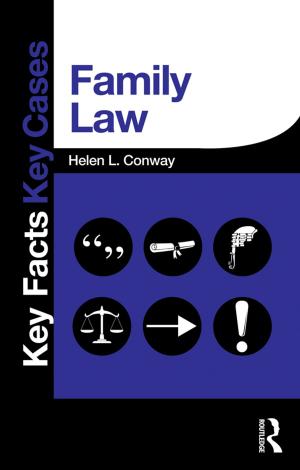Handbook of Consumer Behavior, Tourism, and the Internet
Business & Finance, Industries & Professions, Hospitality, Tourism & Travel, Information Management, Nonfiction, Computers, Internet| Author: | Juline Mills, Rob Law | ISBN: | 9781136429194 |
| Publisher: | Taylor and Francis | Publication: | July 4, 2013 |
| Imprint: | Routledge | Language: | English |
| Author: | Juline Mills, Rob Law |
| ISBN: | 9781136429194 |
| Publisher: | Taylor and Francis |
| Publication: | July 4, 2013 |
| Imprint: | Routledge |
| Language: | English |
Make the most of your online business resources
The growing acceptance and use of the Internet as an increasingly valuable travel tool has tourism and hospitality businesses taking a critical look at their business-to-customer online environments while pondering such questions as, How do I get people to visit my Web site? Is my Web site attracting the ’right’ kind of e-consumers? and How do I turn browsers into buyers? The Handbook of Consumer Behavior, Tourism, and the Internet analyzes the latest strategies involving Internet business applications that will help you attract-and keep-online travel customers. Researchers from the United States, Europe, and Asia present the latest findings you need to make the right decisions regarding long-term e-commerce development and planning.
The Handbook of Consumer Behavior, Tourism, and the Internet examines vital issues affecting the travel and tourism industry from an online perspective. This book analyzes the latest theory and research on general online buyer characteristics, the differences between online and offline consumer behavior, the differences between broadband and narrowband users, the online search process, quality and perception of lodging brands, and Web site design, maintenance, and development. Each section of the book includes a model/diagram that serves as an overview of the topic, followed by a thorough discussion on the topic from several sources. Each section ends with commentary on the areas where future research is needed. The book’s contributors use a variety of research methodologies ranging from qualitative data analyses using artificial neutral network analysis, to experimental design, non-parametric statistical tests, and structural equation modeling.
Topics examined in the Handbook of Consumer Behavior, Tourism, and the Internet include:
-
the need for businesses to use internal examinations to determine and meet online consumer needs
-
the emerging field of e-complaint behavior-consumers taking to the Web to voice complaints about travel services
-
how to use e-tools to measure guest satisfaction
-
how to measure consumer reaction to Web-based technology
-
the Internet’s impact on decision making for travel products
-
and how to use e-mail marketing, electronic customer relationship management (eCRM), Web positioning, and search engine placement
The Handbook of Consumer Behavior, Tourism, and the Internet is equally valuable as a classroom resource or professional reference, providing up-to-date material on Internet applications and their impact on consumers and e-commerce.
Make the most of your online business resources
The growing acceptance and use of the Internet as an increasingly valuable travel tool has tourism and hospitality businesses taking a critical look at their business-to-customer online environments while pondering such questions as, How do I get people to visit my Web site? Is my Web site attracting the ’right’ kind of e-consumers? and How do I turn browsers into buyers? The Handbook of Consumer Behavior, Tourism, and the Internet analyzes the latest strategies involving Internet business applications that will help you attract-and keep-online travel customers. Researchers from the United States, Europe, and Asia present the latest findings you need to make the right decisions regarding long-term e-commerce development and planning.
The Handbook of Consumer Behavior, Tourism, and the Internet examines vital issues affecting the travel and tourism industry from an online perspective. This book analyzes the latest theory and research on general online buyer characteristics, the differences between online and offline consumer behavior, the differences between broadband and narrowband users, the online search process, quality and perception of lodging brands, and Web site design, maintenance, and development. Each section of the book includes a model/diagram that serves as an overview of the topic, followed by a thorough discussion on the topic from several sources. Each section ends with commentary on the areas where future research is needed. The book’s contributors use a variety of research methodologies ranging from qualitative data analyses using artificial neutral network analysis, to experimental design, non-parametric statistical tests, and structural equation modeling.
Topics examined in the Handbook of Consumer Behavior, Tourism, and the Internet include:
-
the need for businesses to use internal examinations to determine and meet online consumer needs
-
the emerging field of e-complaint behavior-consumers taking to the Web to voice complaints about travel services
-
how to use e-tools to measure guest satisfaction
-
how to measure consumer reaction to Web-based technology
-
the Internet’s impact on decision making for travel products
-
and how to use e-mail marketing, electronic customer relationship management (eCRM), Web positioning, and search engine placement
The Handbook of Consumer Behavior, Tourism, and the Internet is equally valuable as a classroom resource or professional reference, providing up-to-date material on Internet applications and their impact on consumers and e-commerce.















